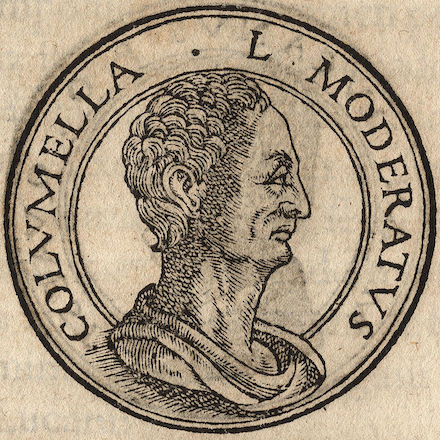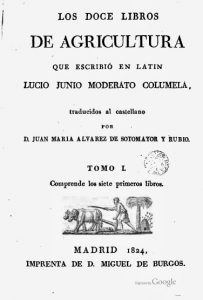Lucius Junius Moderatus, known as Columela, was born in Gades (the current Cádiz), in the Roman Bética region, in the year 4 AD. A friend of Seneca, he held the position of military tribune in the Sixth Ironclad Legion (Legio VI Ferrata) in Syria. After this, he moved to Rome, where he devoted himself to large scale agriculture and put his knowledge into practice, which he expressed in his writings. Inspired by earlier works by Cato the Elder, Varro and other Latin, Greek and even Carthaginian authors, he wrote his work De Re Rustica (which means fieldwork). The work is divided into 12 books, and exposes the most practical and detailed description of ancient agronomy. He delves into, among other things, pest control, the conditioning of the land for planting crops with technical measures together with religious or mystical rites, which approximate what we now know as biodynamic crops. He describes beekeeping, livestock, horticulture, life on the farm (rustic calendar, food processing), veterinarianism, the description of man in the country and how to be a good foreman, viticulture and of course, the management of olive cultivation. It was not until 1824 that the work was translated literally and entirely from Latin by Juan María Álvarez de Sotomayor Rubio. It is a work cataloged and recognized as «a general utility and easy application for the uses of life»
Here is an excerpt from Columela, an innovator of his time and ours, from the 50th chapter of his twelfth book:
With the harvesting of the olive, there are some precautions that must be taken to have it in the mill, and how to extract different kinds of oil.
The most proportionate time for the olive harvest is normally at the beginning of December. If you do it well before this time the oil is acidic, … Around t these months the green oil is extracted, …… but it is of the greatest utility to extract the green, not only because it leaves a lot, but also because with its heat it almost doubles the income of the owner.
The fruit that is taken every day is crushed and pressed instantly …. The millstones are easier to handle, and they can also be lowered or raised according to the magnitude of the olives, so as not to break the bone that would alter the taste of the oil.
Since the olives begin to vary in color and there are already some blacks among many white ones, it is convenient to take them by hand on a serene day and with interwoven wattles or reeds that will extend under the trees, they are be sifted and cleaned. After they are cleaned, in a careful fashion, they will be taken immediately to the mill.
They will be put entirely in new baskets and put under the press, where they will be squeezed promptly and for a short time.
You must have three rows of piles in the oil mill. To throw in the first, the oil of first quality, that is, that of the first pressing. In the second, that of the second and in the third that of the third. It is of the utmost importance not to mix that of the second pressing and much less that of the third with that of the first.
Because the one that comes out pure with the littlest effort of the press makes an oil that is of much better taste than the others.
You obtain a lot more money from the high price of the green oil than from the great abundance of the bad oil.
Columela died in Taras (modern Taranto) around 60-70 AD. C.


